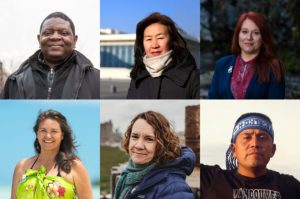The Goldman Environmental Prize is the world’s largest and most prestigious annual award for grassroots environmentalists. Many people refer to it as the “green Nobel.” Goldman Prize winners are models of courage, and their stories are powerful and truly inspiring. “The Prize recognizes individuals for sustained and significant efforts to protect and enhance the natural environment, often at great personal risk. Each winner receives a financial award. The Goldman Prize views ‘grassroots’ leaders as those involved in local efforts, where positive change is created through community or citizen participation in the issues that affect them. Through recognizing these individual leaders, the Prize seeks to inspire other ordinary people to take extraordinary actions to protect the natural world.” 2019 is the prize’s 30th year.
This year’s prize recipients (one from each of the six inhabited continental regions of the world) are:
- Linda Garcia—Washington, USA: Linda Garcia organized Fruit Valley residents to stop the construction of the Tesoro Savage oil export terminal in Vancouver, Washington, in February 2018. Her activism safeguarded residents from harmful air pollution and protected the environment of the Columbia River Gorge. By preventing North America’s largest oil terminal from being built, Garcia halted the flow of 11 million gallons of crude oil per day from North Dakota to Washington. (Relevant organizations: Washington Environmental Council, and Stand Up to Oil)
- Alfred Brownell—Liberia: Under threat of violence, environmental lawyer and activist Alfred Brownell stopped the clear-cutting of Liberia’s tropical forests by palm oil plantation developers. His campaign protected 513,500 acres of primary forest that constitute one of the world’s most important biodiversity hotspots, enabling indigenous communities to continue their stewardship of the forest. For his safety, he is living in temporary exile in the United States. (Relevant organizations: Green Advocates, and Rainforest Action Network)
- Jacqueline Evans—Cook Islands (South Pacific): Conservationist Jacqueline Evans led a five-year grassroots campaign to protect the Cook Islands’ stunning marine biodiversity. Because of her tireless and persistent organizing, in July 2017, the Cook Islands enacted new legislation—Marae Moana—to sustainably manage and conserve all 763,000 square miles of the country’s ocean territory, including the designation of marine protected areas (MPAs) 50 nautical miles around the islands, protecting 125,000 square miles of ocean from large-scale commercial fishing and seabed mining. (Relevant organizations: Marae Moana Marine Park, and Te Ipukarea Society)
- Alberto Curamil—Chile: Alberto Curamil, an indigenous Mapuche, organized the people of Araucanía to stop the construction of two hydroelectric projects on the sacred Cautín River in central Chile. The destructive projects, canceled in late 2016, would have diverted hundreds of millions of gallons of water from the river each day, harming a critical ecosystem and exacerbating drought conditions in the region. In August 2018, Curamil was arrested and remains in jail today. Colleagues believe that he was arrested because of his environmental activism. (Relevant organization: Alianza Territorial Mapuche) #FreeAlbertoCuramil
- Ana Colovic Lesoska—North Macedonia: Ana Colovic Lesoska led a seven-year campaign to cut off international funding for two large hydropower plants planned for inside Mavrovo National Park—North Macedonia’s oldest and largest national park—thereby protecting the habitat of the nearly-extinct Balkan lynx. In 2015, the World Bank withdrew its financing for one hydropower project, and, in 2017, the European Bank for Reconstruction and Development canceled its loan to the North Macedonian government for the other. (Relevant organizations: Eco-Svest, and Bankwatch Network)
- Bayarjargal Agvaantseren—Mongolia: Bayarjargal Agvaantseren helped create the 1.8 million-acre Tost Tosonbumba Nature Reserve in the South Gobi Desert—a critical habitat for the vulnerable snow leopard—in April 2016, then succeeded in persuading the Mongolian government to cancel all 37 mining licenses within the reserve. An unprecedented victory for the snow leopard, as of June 2018 there are no active mines within the reserve—and all mining operations are illegal. (Relevant organizations: Snow Leopard Trust, and Snow Leopard Conservation Foundation)
Click on each recipient’s name to read a longer profile—and watch a brief video—about their remarkable efforts and achievements.
Here’s the video about Linda Garcia of Washington State (USA):
And here’s the video about Alberto Curamil of Chile:
Posts on Goldman Prize winners from previous years:


{ 0 comments… add one now }